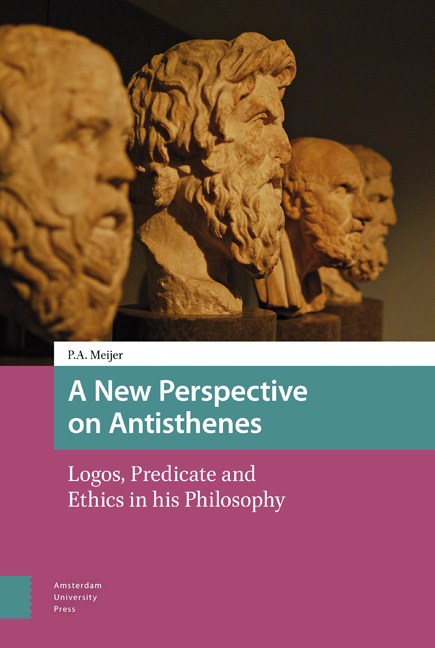Book contents
- Frontmatter
- Dedication
- Contents
- Preface
- Abbreviations
- Primary Sources – Editions Used
- Introduction
- Part I LOGOS AND PREDICATE
- Part II ANTISTHENES’ VIEWS ON THEOLOGY: HIS THEORETICAL APPROACH TO THE STUDY OF HOMER
- Part III ANTISTHENEAN ETHICS
- Epilogue: Antisthenes, an Assessment
- Appendix II The Speeches of Ajax and Odysseus
- Bibliography
- Concordance Giannantoni (SSR) – Caizzi (D.C.)
- Index
Chapter VII - Antisthenes and Xenophon
Published online by Cambridge University Press: 24 December 2020
- Frontmatter
- Dedication
- Contents
- Preface
- Abbreviations
- Primary Sources – Editions Used
- Introduction
- Part I LOGOS AND PREDICATE
- Part II ANTISTHENES’ VIEWS ON THEOLOGY: HIS THEORETICAL APPROACH TO THE STUDY OF HOMER
- Part III ANTISTHENEAN ETHICS
- Epilogue: Antisthenes, an Assessment
- Appendix II The Speeches of Ajax and Odysseus
- Bibliography
- Concordance Giannantoni (SSR) – Caizzi (D.C.)
- Index
Summary
Introduction
Antisthenes appears occasionally in Xenophon's Memorabilia and in his Symposium. His performance is often in character: he is presented as not the most subtle debater or participant in the talks that Xenophon describes, or rather in the talks that Xenophon constructs. Xenophon is not reliable, as is well known. His claims to have been present at conversations he describes are notorious because at times it is obvious that he could not have been present (e.g. being only seven in 422 B.C., the date of his Symposium). Nevertheless, this does not imply that everything he tells us is false. We have to reckon with the fact that he could have used authentic material that he couched in the form of the conversations or descriptions. There are indeed many subjects presented in Xenophon's works which were also discussed by Antisthenes. We have already seen the interest of both writers in Cyrus, and both have something to say about the teachability of virtue, although they differ on this point. But there is much more correspondence. In Giannantoni there is a long list of the possible influences Antisthenes had on Xenophon – bait for scholarly discussion because many of the socalled influences are not much more than vague suggestions.
There is an interesting fragment that states that Antisthenes was one of Socrates’ closest friends and followers and that he never abandoned him (Mem. 2.11.17). When Xenophon makes Antisthenes appear in a conversation about friendship, he explicitly says that he, Xenophon, heard this conversation (Mem. 2.5.1-5). Xenophon must have been keen on what Antisthenes had to say about Socrates and his views.
Jealousy and envy
Antisthenes said that jealousy consumes people the way rust affects iron: ‘As iron is eaten away by rust, so he said, the envious are consumed by their own habit’. In Xenophon and also elsewhere (e.g. Plato Apology 33A6-8), Socrates says that he does not ‘begrudge’ (ϕθονέω, ϕθόνος) or refuse to grant other people the benefits of his companionship. In fact, we find the same notion in Xenophon's Symposium spoken by the character Antisthenes, who says that he distributes the riches of his soul to his friends without jealousy or grudge.
- Type
- Chapter
- Information
- A New Perspective on AntisthenesLogos, Predicate and Ethics in his Philosophy, pp. 143 - 148Publisher: Amsterdam University PressPrint publication year: 2017



